Vices Virtues
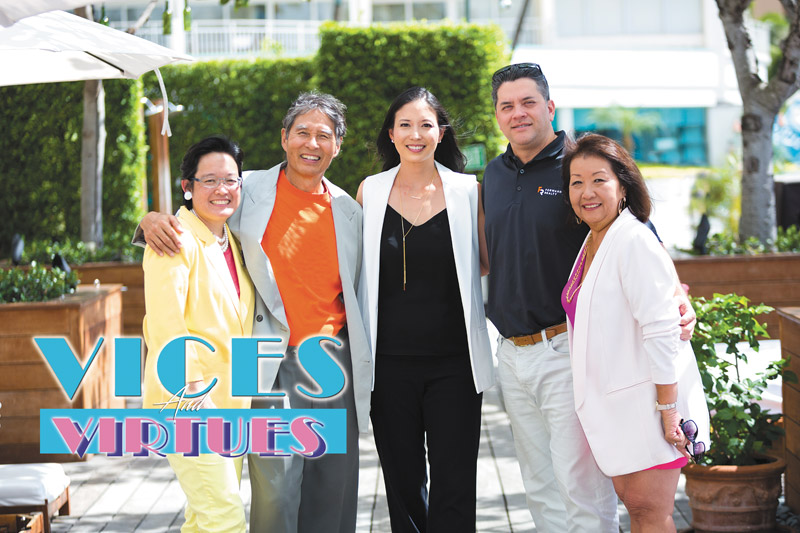
Pictured are (from left) Lori Shimoda of I Am A Scientist, George Kon of T-Shirt Theatre, GIFT Foundation event co-chairs Erin Shon and Trevor Benn, and Joan Naguwa of HUGS.
GIFT Foundation’s Miami Vice-themed party benefitted three virtuous local nonprofits this year: T-Shirt Theatre, I Am A Scientist and HUGS.
Every year since 2003, GIFT Foundation has thrown one helluva hullabaloo for three local nonprofits.
“Our mission is very simple: to inspire our peers and encourage young adults to participate in philanthropic giving. We do that through one annual fundraising event every year — essentially a super fun, crazy Halloween party,” says Erin Shon, co-chair of this year’s shindig, which saw 700 guests party the night away Oct. 21 at The Modern Honolulu under the theme “Miami Vices & Vixens.”
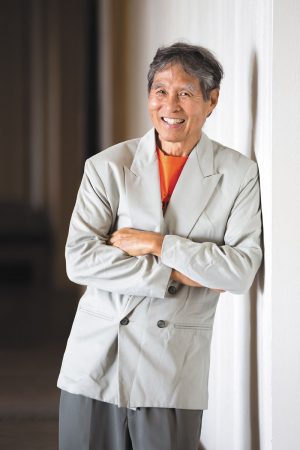
We are a low-tech, high-zest community of practice,” explains artistic director George Kon, who also serves as executive director of ADE. “We use drama to help young Kalihi rehearse for life.
Since its inception, GIFT Foundation has given $2.5 million to various nonprofits. This year’s beneficiaries are The Alliance for Drama Education’s T-Shirt Theatre; Chaminade University’s I Am A Scientist mobile outreach program; and Help, Understanding & Group Support (HUGS).
“That’s what makes us unique,” explains co-chair Trevor Benn. “There isn’t a fixed beneficiary, so we’re able to adapt the beneficiaries based on what the community’s needs might be at a given moment in time.”
And as the following profiles show, GIFT’s, well, gift, can go a long way for the good missions of these groups. Not bad for a night out, huh?
Never underestimate the power of play.
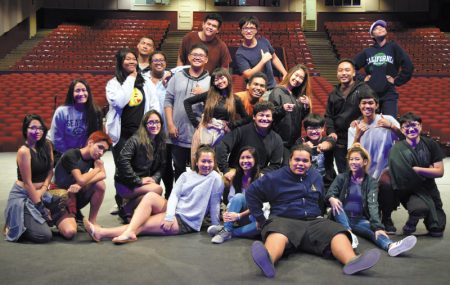
A group of student participants in T-Shirt Theatre, all of whom hail from Kalihi.
PHOTO COURTESY THE ALLIANCE FOR DRAMA EDUCATION
The Alliance for Drama Education’s T-Shirt Theatre program certainly doesn’t.
“We are a low-tech, high-zest community of practice,” explains artistic director George Kon, who also serves as executive director of ADE. “We use drama to help young Kalihi rehearse for life.”
For 32 years, Kalihi kids have been gathering to write, stage and perform short scenes and plays with a message. This year’s production, Kipuka, focuses on prevention of bullying, cyberbullying and suicide.
Kipuka, Kon says, refers to “an oasis in the middle of the lava field,” or those small groups or people that provide a haven for youth during hard times. Kipuka hopes to offer a template, a resource for kids to draw on.
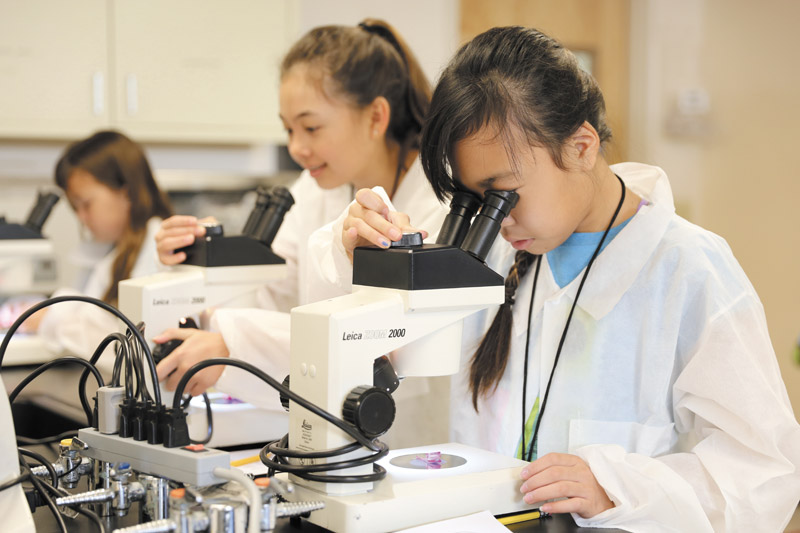
A participant in I Am A Scientist uses a microscope. PHOTO COURTESY I AM A SCIENTIST
Kon offers an example of one scene within the play, written by a girl struggling with her mental health.
“She just locked herself in her room and … as she was touching and making contact with her floor, she evolved this little practice. She does ‘five things I can touch, four things I can see, three things I can hear, two things I can smell and one thing I can taste.’ She keeps repeating this mantra until she’s able to settle down. “When I first heard this, I was so struck by how much that’s very close to a yogic practice. She evolved that out of her own emergency. She found that kipuka within herself.”
Right now, T-Shirt Theatre regularly performs in the Kalihi area, but GIFT Foundation’s grant will enable the group to expand to new venues, mediums and platforms, reaching out to new kids in need of guidance.
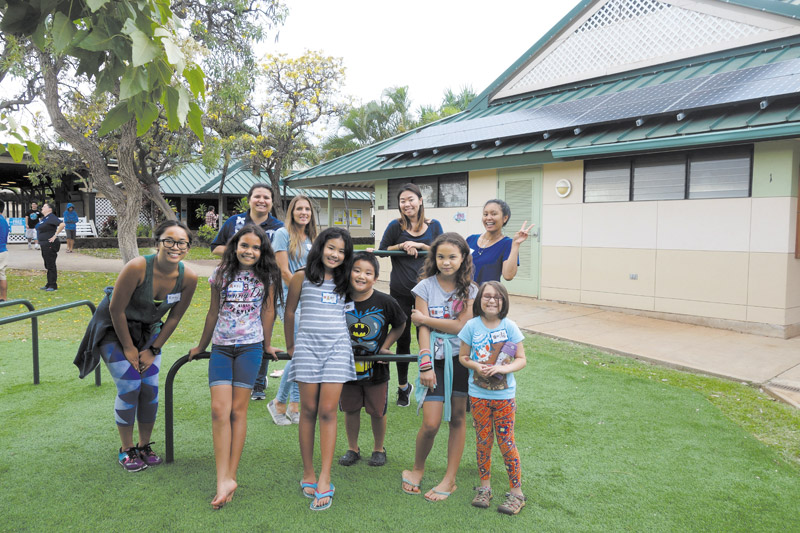
HUGS children enjoy activities with their volunteer buddies at monthly respite events.
PHOTO COURTESY HUGS
Public performances of Kipuka run at 7:30 p.m. Nov. 16 and 4:30 p.m. Nov. 19 at Farrington High School auditorium. Admission is free, with a suggested $5 donation. For more information, find T-Shirt Theatre on Facebook.
Contrary to the name, Chaminade University’s mobile STEM outreach program I Am A Scientist is not about persuading kids to become scientists.
“(The reality is) everyone needs to know some math and science and not be afraid of it,” says program director Lori Shimoda. “The saddest thing for us is to hear some kids saying, ‘I’m not good at math, I’m not good at science.’ It’s just that they haven’t encountered it in a way that is meaningful and fun for them.”
I Am A Scientist thus gives science that meaning and sense of fun by bringing real-life experiments and mentorship into classrooms, and demonstrating to public school keiki in grades K-12 (with a special emphasis on kids in elementary school) how and why it applies to their lives.
A microbiology project, says Shimoda, might ask students to swab their hands or classrooms and later observe the “living world around them” that they cannot normally see. Other kids might extract their own DNA, or mimic the spread of contagions.
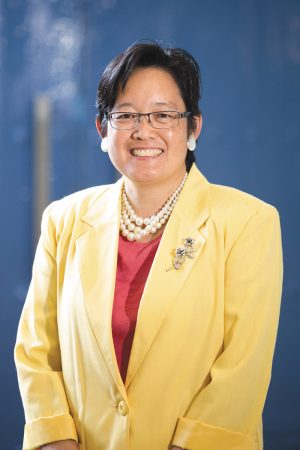
Everyone needs to know some math and science and not be afraid of it.
“They practice the scientific method, they use scientific equipment and they’re taught by real scientists and people in the science field,” affirms Shimoda, who also serves as a research associate at Chaminade.
“When they get to do activities that utilize math, graphing, statistics, scientific thinking, and they do it with ease, then you bring to their attention: ‘You just did that.’ And they’re like, ‘I did!’ That’s what we want to do; we want to get them so they have no biases about math and science.”
GIFT Foundation’s grant will serve as a stepping-stone of sorts for the project. Since 2009, the group has been collecting data on the program’s effectiveness in hopes of pursuing long-term federal funding. The GIFT monies also will help hire new staff and bring the program to more schools outside the Honolulu area.
Teachers or parents interested in requesting a free visit from I Am A Scientist should fill out the request form at iamascientiststem.org.
When a child suffers from life-threatening illness, their family suffers with them.
That’s where HUGS enters the picture.
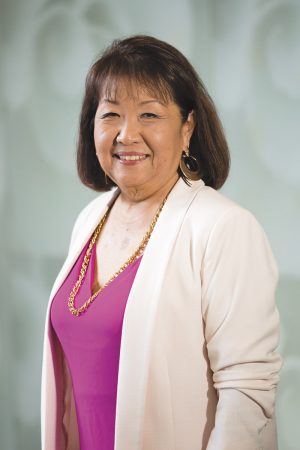
In a nutshell, HUGS provides hugs.
“In a nutshell, HUGS provides hugs,” says executive director Joan Naguwa. “We serve all members of the family, not just the child, but moms and dads and siblings.”
This service comes in the form of just about anything the family might need through these challenging times, for as long as they need it: bedside checkers games for sick kids, momand dad-oriented nights out, family respite events, financial aid and more.
One event that stands out for Naguwa is HUGS’ sibling camp.
“We take the kids camping for three days,” she says. “They go through the fun stuff of camping, as well as activities that help them talk about what it’s like to have a brother or sister that is ill, what are your own fears, how do you learn to deal with that.
“Parents have said a lot of their children have come back transformed from that little experience.”
But the best help HUGS can facilitate is that quiet camaraderie of understanding.
“The families have often told us, ‘I have great family and friends, but it’s really not the same as somebody that has already walked through what I am currently walking through,'” Naguwa says.
“I saw literally the other night at moms night, a mom who had lost her child in June, talking to a mom who had lost hers a year and a half ago. And at the end of that two-hour evening meal, they were trading phone numbers.
“It’s that kind of natural support.”
HUGS will use its GIFT Foundation grant to further expand its peer-support program to the neighbor islands.
HUGS kicks off its latest social media campaign Nov. 2. Titled Hugs4HUGS, the campaign asks people to hug their loved ones or those in need, donate $1 to HUGS and post about it on Facebook or Instagram by tagging @hugshawaii and using hashtag #hugs4HUGS. The goal is 10,000 hugs and $10,000 by Dec. 8. There are other ways to donate, too. Visit hugshawaii.org for more information.





